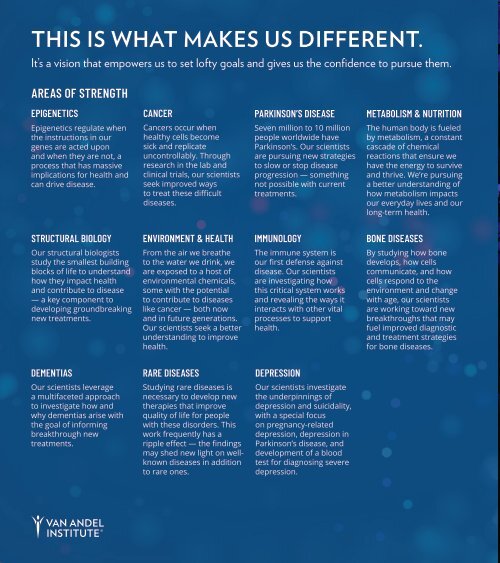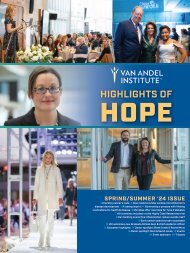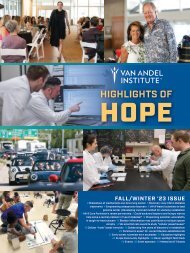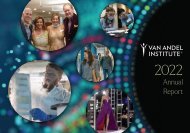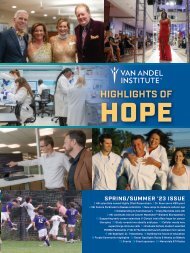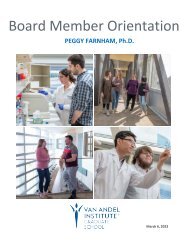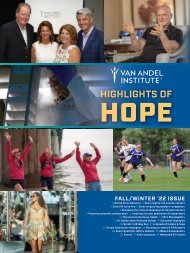VAI Folio 2023
Create successful ePaper yourself
Turn your PDF publications into a flip-book with our unique Google optimized e-Paper software.
THIS IS WHAT MAKES US DIFFERENT.<br />
It’s a vision that empowers us to set lofty goals and gives us the confidence to pursue them.<br />
AREAS OF STRENGTH<br />
EPIGENETICS<br />
CANCER<br />
PARKINSON’S DISEASE<br />
METABOLISM & NUTRITION<br />
Epigenetics regulate when<br />
the instructions in our<br />
genes are acted upon<br />
and when they are not, a<br />
process that has massive<br />
implications for health and<br />
can drive disease.<br />
Cancers occur when<br />
healthy cells become<br />
sick and replicate<br />
uncontrollably. Through<br />
research in the lab and<br />
clinical trials, our scientists<br />
seek improved ways<br />
to treat these difficult<br />
diseases.<br />
Seven million to 10 million<br />
people worldwide have<br />
Parkinson’s. Our scientists<br />
are pursuing new strategies<br />
to slow or stop disease<br />
progression — something<br />
not possible with current<br />
treatments.<br />
The human body is fueled<br />
by metabolism, a constant<br />
cascade of chemical<br />
reactions that ensure we<br />
have the energy to survive<br />
and thrive. We’re pursuing<br />
a better understanding of<br />
how metabolism impacts<br />
our everyday lives and our<br />
long-term health.<br />
STRUCTURAL BIOLOGY<br />
ENVIRONMENT & HEALTH<br />
IMMUNOLOGY<br />
BONE DISEASES<br />
Our structural biologists<br />
study the smallest building<br />
blocks of life to understand<br />
how they impact health<br />
and contribute to disease<br />
— a key component to<br />
developing groundbreaking<br />
new treatments.<br />
From the air we breathe<br />
to the water we drink, we<br />
are exposed to a host of<br />
environmental chemicals,<br />
some with the potential<br />
to contribute to diseases<br />
like cancer — both now<br />
and in future generations.<br />
Our scientists seek a better<br />
understanding to improve<br />
health.<br />
The immune system is<br />
our first defense against<br />
disease. Our scientists<br />
are investigating how<br />
this critical system works<br />
and revealing the ways it<br />
interacts with other vital<br />
processes to support<br />
health.<br />
By studying how bone<br />
develops, how cells<br />
communicate, and how<br />
cells respond to the<br />
environment and change<br />
with age, our scientists<br />
are working toward new<br />
breakthroughs that may<br />
fuel improved diagnostic<br />
and treatment strategies<br />
for bone diseases.<br />
DEMENTIAS<br />
RARE DISEASES<br />
DEPRESSION<br />
Our scientists leverage<br />
a multifaceted approach<br />
to investigate how and<br />
why dementias arise with<br />
the goal of informing<br />
breakthrough new<br />
treatments.<br />
Studying rare diseases is<br />
necessary to develop new<br />
therapies that improve<br />
quality of life for people<br />
with these disorders. This<br />
work frequently has a<br />
ripple effect — the findings<br />
may shed new light on wellknown<br />
diseases in addition<br />
to rare ones.<br />
Our scientists investigate<br />
the underpinnings of<br />
depression and suicidality,<br />
with a special focus<br />
on pregnancy-related<br />
depression, depression in<br />
Parkinson’s disease, and<br />
development of a blood<br />
test for diagnosing severe<br />
depression.<br />
16


